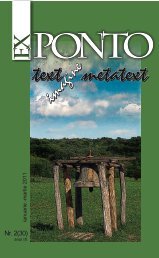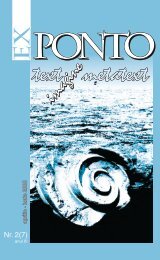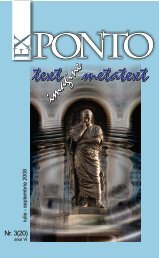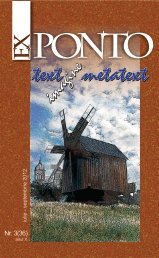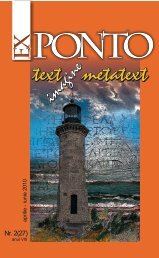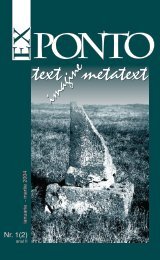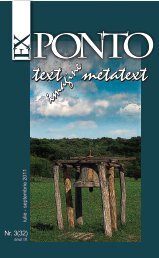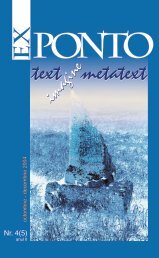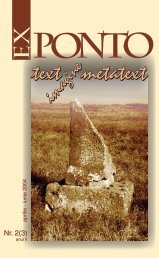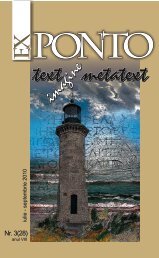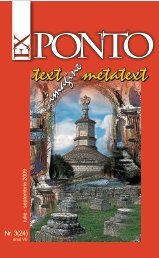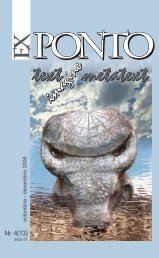ConclusionFrom the Platonic myth of writing to the twentieth century theories of text,writing has crossed a history of confrontation with the surrounding world ofcontextualization and recontextualization. Modernist literary experiments havepushed writing into the realm of self-reflexivity already confirmed by Barthes’Writing Degree Zero. The editing process has been facing various challengesto keep pace with them, as well. From the concrete poetry volumes to the lastartbook experiments, editors deal with other physical instantiations of text:visual, sonorous, kinetic, or functional in a way that diminishes the role ofwriting to make room for other meaningful nontextual expression. At this turningpoint in the culture of writing Blanchot’s words make an alluring prediction:To write without “writing,” to bring literature to that point of absence whereit disappears, where we no longer have to dread its secrets, which are lies, thatis “the degree zero of writing,” the neutrality that every writer seeks deliberatelyor without realizing it, and which leads some of them to silence. 181Jacques Derrida. Dissemination. Translated by Barbara Johnson. Chicago: University ofChicago Press, 1981, p. 23.2Jacques Derrida. Writing and Differance. Translated by Alan Bass. Chicago: University ofChicago Press, 1978, p. 230.3John Kidd. “The Scandal of ‘Ulysses’” in The New York Review of Books. Volume 35,number 11, June 1988.4Randall McLeod. “Gerard Hopkins and the Shapes if His Sonnets” in Voice, Text, Hypertext.Emergin Practices in Textual Studies. Raimonda Modiano, Leroy F. Searle, Peter L. Shillingsburg(eds). Seattle: University of Washington Press, 2003, 177-297.5Op.cit., 262.6Randall McLeod. “Obliterature. Reading a Censored Text of Donne’s ‘To his mistressgoing to bed’”. In English Manuscript Studies 1100-1700, volume <strong>12</strong>, Scribes and Transmissionin English Manuscripts 1400-1700. Beal, Peter, and Edwards, A.S.G. (eds). The British Library,2005, 85-138.7E.D. Hirsch. “In Defense of the Author” in Validity in Interpretation. Yale: Yale UniversityPress, 1967, p. 8.8Randall McLeod. “Editing Shakespeare” in Clod, Random [Randall McLeod.]. "InformationUpon Information." Text 5, 1991, 241-81.9Infinitive text recalls Jack Stillinger’s theory of versions, equally important and valid: “allauthoritative versions are equally authoritative”.10Patrick Fuery. The Theory of Absence. Subjectivity, Signification, and Desire. Westport:Greenwood Press, 1995, 103.11Marta Werner. Emily Dickinson’s Open Folios: Scenes of Reading, Surfaces of Writing.Ann Arbor: University of Michigan Press, 1995, 2.<strong>12</strong>Marta Werner. Writing’s Other Scene, 206.13Hans Zeller. “A New Approach to the Critical Constitution of Literary Texts” in Studies inBibliography, vol. 28, 1979, 261.14Jerome McGann. “The Garden of Forking Paths. What is Critical Editing” in TextualCondition. Princeton: Princeton University Library, 1991, 86.15Ibidem, 6316Ibidem, 66.17McGann, 146.18Maurice Blanchot. The Book to Come. Translated by Charlotte Mandell. Stanford: StanfordUniversity Press, 2003, 207.Ex Ponto nr.3, <strong>2006</strong>87
orizonturile esteticuluiDUMITRU TIUTIUCAEstetica fractalilor,o perspectivă promiţătoare pentru onouă teorie literarăHEx Ponto nr.3, <strong>2006</strong>ermeneutica modernă modelează o nouă viziune de abordare a operei literareprin prisma teoriei fractalilor şi, implicit, actualizează la nivelul literarului,schimbarea de paradigmă ilustrată de noile teorii ale morfogenezei.Poeticienii secolului al XX-lea continuă ce începuseră romanticii veaculuial XIX-lea prin ontologia şi epistemologia fragmentului şi iregularului.Teoria fractalilor 1 vine în întâmpinarea acestei realităţi. Teoria fractalilor afost întemeiată de matematici<strong>anul</strong> Benoit Mandelbrot, cu O teorie a seriilorfractale (1975), care mai târziu a devenit cartea sa manifest ce a revoluţionatcunoaşterea: Geometria fractală. În 1982, Mandelbrot şi-a extins două eseurianterioare, creând lucrarea deschizătoare de drumuri, Geometria fractală anaturii. Evident, inclusiv cuvântul fractal a fost inventat de el, derivându-l dinlat.fractus, derivat din verbul frangere („a sparge, a rupe în bucăţi, a zdrobi”).„Fractal înseamnă fragmentat, fracţionat, neregulat, întrerupt.” 2Iniţial, mulţi matematicieni au considerat aceste forme patologice, dizgraţioasesau chiar dezgustătoare. Pe scurt, fractali sunt toate acele ciudăţeniicare umplu spaţiul şi pe care matematicienii le abandonaseră ca fiind dezarmantde complexe. Mandelbrot nota patetic: „Deoarece cuvântul algebrăderivă din cuvântul arab jabara („a lega impreună"), între cuvintele fractal şialgebră este o contradicţie etimologică".Prin 1980 grafica pe calculator a progresat într-atât încât forme ca „Liniade coastă Koch" şi „Covorul lui Sierpinski" puteau fi reprezentate cu detaliiexplicite. Geometria fractală a naturii era o galerie a acestora şi a altor formegeometrice, dintre care multe nu fuseseră văzute niciodată. Multe dintre eleerau simple automate celulare în care fiecare linie era transformată repetatîn linii mai mici.Dacă fractal înseamnă, fragmentat, neregulat, fracţionat, întrerupt, „teoriafractalilor se ocupă de forme caracterizate de o neregularitate fundamentală"13 ce se manifestă indiferent de scara de observaţie. Această teorie constituieun limbaj sau o metodă de interpretare a naturii. În natură nu putemdescoperi nici un fragment de materie omogenă - cu o variaţie uniformă aproprietăţilor, de la un punct la altul. După părerea lui Mandelbrot, noţiunilegeometriei euclidiene nu pot reprezenta adecvat formele naturale - norii nusunt sfere, munţii nu sunt conuri... Geometria fractalilor nu recunoaşte, deci,linia, suprafaţa, volumul.88
- Page 2 and 3:
Ex PontoText/imAgine/metatextNr. 3
- Page 4 and 5:
SUMAR♦EditorialOVIDIU DUNĂREANU
- Page 6 and 7:
editorialOVIDIU DUNĂREANUScriitoru
- Page 8 and 9:
poezieIULIA PANĂ* * *Cum ar trebui
- Page 10 and 11:
* * *m-am trezit în astă diminea
- Page 12 and 13:
IOAN ŢEPELEAPoemele mirării care
- Page 14 and 15:
Mona Lisa pare a acoperi chiar şoc
- Page 16 and 17:
în schimb, asfaltul te dinamizeaz
- Page 18 and 19:
în care ai putea să îţi întinz
- Page 20 and 21:
Un ins orbecăia ca în visOchii -
- Page 22 and 23:
Şi în secunda următoareSă apar
- Page 24 and 25:
CLAUDIA VOICULESCURondeluriDoar ste
- Page 26 and 27:
OLIMPIU VLADIMIROVMulţumireTrec nu
- Page 28 and 29:
prozăFLORIN ŞLAPACO teribilă set
- Page 30 and 31:
Ah, a zis Aloisius, ia uite-l şi p
- Page 32 and 33:
viaţa multor fiinţe zaharisite, a
- Page 34 and 35:
crede în ce facem noi. Apoi, câte
- Page 36 and 37:
- Dar sensibiloasă mai eşti, se s
- Page 38 and 39:
publicul avizat (şi nu numai) al u
- Page 40 and 41:
Din somn mă scoală-n miez denoapt
- Page 42 and 43:
Lumina cunoştinţii să-i facă ar
- Page 44 and 45: memorialisticăPERICLE MARTINESCUPa
- Page 46 and 47: asta este şi drama ţării mele, a
- Page 48 and 49: provocând pagube importante, deşi
- Page 50 and 51: formidabil, într-adevăr: nouă bo
- Page 52 and 53: 11 iulie Mâine dimineaţă plec la
- Page 54 and 55: locul lor, tejgheaua şi rafturile
- Page 56 and 57: cărui frunze fâşâiau în vânt
- Page 58 and 59: originalul de lângă mine - la sca
- Page 60 and 61: traduceri din literatura românăIL
- Page 62 and 63: Rituella fête met cet être en tra
- Page 64 and 65: elogios, recunoaşterea unanimă. P
- Page 66 and 67: Furtuni înnebunind azurul, scutur
- Page 68 and 69: Mă voi înzdrăveni cu mei proasp
- Page 70 and 71: Cu suflu-i arzător crăpând buzel
- Page 72 and 73: Marin Gherasim - Diptic, 1994, ulei
- Page 74 and 75: IIIMarin Gherasim - Kairos, 2001, t
- Page 76 and 77: Marin Gherasim - Aripă, 2000,ulei
- Page 78 and 79: imagineMarin GherasimUn spirit inte
- Page 80 and 81: Retrospectivă la Muzeul Naţional
- Page 82 and 83: invitat „ex ponto”CARMEN CHIHAI
- Page 84 and 85: vine din povestea lor. Or, noi avem
- Page 86 and 87: Paradoxically, the myth of the unfo
- Page 88 and 89: validate or invalidate the choices,
- Page 90 and 91: versions, even those which contain
- Page 92 and 93: tries to separate the editor’s do
- Page 96 and 97: Fractalul este foarte aproape de pe
- Page 98 and 99: Conceptul de text matricial (aplica
- Page 100 and 101: Proximităţi şi diferenţe, unele
- Page 102 and 103: Citit retrospectiv, Ionescu nimere
- Page 104 and 105: avangardaPAUL CERNATÎntre extremel
- Page 106 and 107: Cu relativă simpatie „revoluţio
- Page 108 and 109: cu un cuprinzător eseu al d-lui Ni
- Page 110 and 111: *În paginile revistei Integral nu
- Page 112 and 113: la „stânga plasticei şi a liris
- Page 114 and 115: geri a separării dintre artistic
- Page 116 and 117: dar cu apucături de satir. Lukrezz
- Page 118 and 119: participa direct la strălucirea su
- Page 120 and 121: situaţii politice, a bravat fără
- Page 122 and 123: Portretul de anarhist, pe care şi-
- Page 125 and 126: Poate nu întâmplător, cel care-i
- Page 127 and 128: mari scriitori români contemporani
- Page 129 and 130: se uite la foaia de/ Hârtie, care-
- Page 131 and 132: la recensământ.)/ -Pe-astea să l
- Page 133 and 134: (…)// Peste câţiva ani/ A înce
- Page 135 and 136: Ex Ponto nr.3, 2006baston, indifere
- Page 137 and 138: cronica literarăNICOLAE ROTUNDCons
- Page 139 and 140: Ex Ponto nr.3, 2006comentează în
- Page 141 and 142: priveam pe furiş maxilarele descă
- Page 143 and 144: Ex Ponto nr.3, 2006Nicolae Motoc pr
- Page 145 and 146:
VALERIA MANTA TĂICUŢURăpit pe ve
- Page 147 and 148:
Apelul la miturile precreştine est
- Page 149 and 150:
Ex Ponto nr.3, 2006şi scadenţa M(
- Page 151 and 152:
Ex Ponto nr.3, 2006cel al gepidei A
- Page 153 and 154:
Ex Ponto nr.3, 2006lizare discursiv
- Page 155 and 156:
Ex Ponto nr.3, 2006decât necesară
- Page 157 and 158:
Ex Ponto nr.3, 2006‹‹cochilie
- Page 159 and 160:
cronica literaturii străineADINA V
- Page 161 and 162:
Ex Ponto nr.3, 2006Titlul romanul a
- Page 163 and 164:
de a-l găsi pe cel care a salvat-o
- Page 165 and 166:
Ex Ponto nr.3, 2006158aservirii rus
- Page 167 and 168:
În mitul grec, odată cu suveranit
- Page 169 and 170:
Ex Ponto nr.3, 2006162nu e conţinu
- Page 171 and 172:
Un fenomen care pare pur occidental
- Page 173 and 174:
studii culturaleMARCOS FARIAS-FERRE
- Page 175 and 176:
Ex Ponto nr.3, 2006assume meaning i
- Page 177 and 178:
Ex Ponto nr.3, 2006in rapid transit
- Page 179 and 180:
Ex Ponto nr.3, 2006contingency of t
- Page 181 and 182:
production about the ‘internation
- Page 183 and 184:
Ex Ponto nr.3, 2006Dar peripeţiile
- Page 185 and 186:
Ex Ponto nr.3, 2006(24 dec. 1672 -
- Page 187 and 188:
Ex Ponto nr.3, 20061705, ambii ai P
- Page 189 and 190:
Ex Ponto nr.3, 2006Constantin Brân
- Page 191 and 192:
Ex Ponto nr.3, 2006‘separatist’
- Page 193 and 194:
Ex Ponto nr.3, 2006succedea pe tron
- Page 195 and 196:
al XVII-lea - pentru a ne limita do
- Page 197 and 198:
41Arhimandritul Neofit a ocupat fun
- Page 199 and 200:
o imagine cuprinzătoare a contribu
- Page 201 and 202:
Ex Ponto nr.3, 2006Din subcapitolul
- Page 203 and 204:
Ex Ponto nr.3, 2006Din primul studi
- Page 205 and 206:
să devină fiinţe sociale, căci
- Page 207 and 208:
sociologia cărţiiCONSTANTIN CIORO
- Page 209 and 210:
în biblioteci. Cronicarii literari
- Page 211 and 212:
Ex Ponto nr.3, 2006Lui Debussy îi
- Page 213 and 214:
Ex Ponto nr.3, 2006cumente preţioa
- Page 215 and 216:
Salonul Internaţional de carte „
- Page 217 and 218:
Ex Ponto nr.3, 2006scriitorii înş




